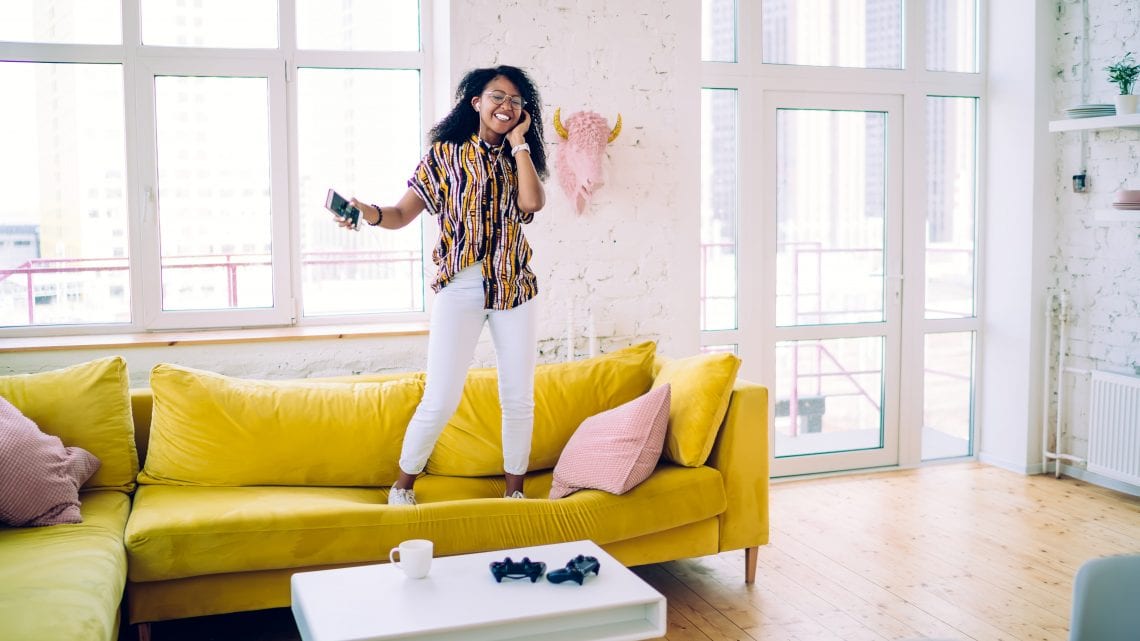
What it’s Really Like to Live Alone During the Lockdown (from People who Know)
The coronavirus crisis is affecting us all in different ways, and one group we’re hearing about a lot at the moment are people who live alone.
With similarities to annual Christmas campaigns, much of the coverage is concerned, lovely and well-intended. And important — it’s critical that those who are struggling with the effects of isolation & loneliness are able to access support when they need it, particularly where they are vulnerable. Yet the underlying assumption — that we are all victims, crying into our pillows every night – is a limiting one.
It’s a common stereotype that people who live alone are inherently lonely. However loneliness implies a sense of disconnect – of being alone in the world – which many long-standing ‘solos’ (or people who live alone) struggle to relate to. More and more research shows us that while solos may
not always have a ‘significant other,’ under usual circumstances they are actually on average more likely than those in couples to be connected to a higher number of friends and family, more likely to be active in their local communities, and less likely to experience loneliness than others in the same income bracket. Under usual circumstances, people who live alone use words like resilient, empowered, independent and connected to describe themselves.
In fact, many of the more challenging feelings being experienced by solos at the moment actually stem from typically being very highly connected to others, rather than disconnected – where we do feel loneliness, it’s likely to be one feeling amongst many, and in many cases may not the predominant one. At the Living Well Alone Project, we manage an online community of nearly 12,000 solos, who know that the real picture is far more nuanced. So I thought I’d use this opportunity to describe ten other feelings which characterise the ups and downs of living alone through the lockdown, drawing on what we’ve heard from the solo community. Hint: it’s more complicated than you might think!
1) Touch deprived / physically isolated. For most solos, the loss of in-person contact is by far the hardest part of the lockdown. While calls are good and video calls are great, hugs are hard to replicate. This isn’t about being lonely, per se. It’s possible to be highly connected to others, and
still feel the loss of physical contact acutely. We’ve heard from people with autism and mental health needs whose face-to-face support services have been replaced with phone calls, and from people leading busy, active lives who’ve moved all of their usual social activities online. The message is the same – even where you are in regular contact with others, the loss of physical contact is the harshest reality of the lockdown. There are very few work-arounds here, though stroking/cuddling pets, giving yourself a foot massage, warm baths with scented candles, and using weighted blankets can all help calm the sympathetic nervous system. It can also help to plan meet-ups with friends for when the restrictions ease, and visualise yourself
having a lovely hug from a friend.
2) Anxious / overwhelmed. With more time, fewer distractions, and a near-constant stream of daunting news, it’s not surprising that unsettling thoughts can start to seem a lot more overwhelming when you’re alone. Again, this actually stems from being hyper-connected rather than disconnected, and we’re hearing more and more from people who are struggling to manage high levels of anxiety about what’s happening in the world. Disconnection is actually key here – try to limit checking the news to a couple of times a day, and avoid doing this just before bedtime. Journaling, meditation, exercise, and saying your thoughts out loud – to
yourself or to a friend – can all help make thoughts seem smaller and more manageable. It can also be helpful to write down what you can and can’t control, and try to focus on the first. If you are suffering periods of sustained anxiety or depression, however, then it’s very important to
talk to your GP.
3) Sad / grieving. We’re entering a period of collective grieving, and solos are absolutely feeling this too. This can be sadness for those we know who are ill or who have passed away – it can also be sadness for the many thousands who have died, even where we don’t know them. For good or bad, we’re part of a collective grief process shared by millions of people. Self-care and allowing yourself time to grieve are really important – and if you can, regularly talking over how you’re feeling with a friend.
4) Relieved. Many solos are telling us that they’re feeling a strong sense of the relief at the moment. This can be relief from the fear of catching the virus, and also from the fear of passing it on to others. There can be relief that the pace of life has slowed down – for more introverted types, this can be relief from feeling as though you have to socialise if you don’t want to, and for others it’s relief from feeling as though you have to keep with everyone else. Whatever the individual reason, relief is a very common emotion at the moment.
5) Appreciative / grateful. With the lockdown limiting every aspect of our lives, many solos have told us that they’re feeling more and more grateful for what they have. There are many positives in having your own space, including the peace, quiet, and freedom to run to your own schedule. We’re also realising what and who we value, and feeling grateful for the little things – birds singing, the post arriving, skype coffee dates with co-workers, our daily walks. We also know now who we really miss! It’s possible to cultivate gratitude as a powerful counter to anxiety and depression, and worth building at least some practices into your daily routine.
6) Peaceful / content. While being alone with your thoughts can be difficult, it can also be opportunity for stillness and reflection. Many people who live alone are finding that the quiet and the slower pace means the lockdown is an opportunity to take time out to recharge, reflect, and to focus on what’s really important to them. Meditation, yoga, prayer and other forms of spiritual practice can all help cultivate a deep sense of peace and contentedness.
7) Focused / motivated. From upcycling to gardening, cleaning to house repairs, paperwork to skills-sharing, to gaming, reading and arts and crafts, solos already good at structuring and filling alone-time – and in some ways the lockdown just presents another opportunity to get things done. It’s also time which many are using for goal-setting, learning new skills and personal growth.
8) Connected. With more time on our hands, many of us are reaching out to (and hearing from) people we’ve not spoken to for a while. We’re also talking to our neighbours more – whether it’s through clapping on the doorstep, dropping off supplies, or swapping phone numbers. Rather than making us more isolated, many solos are finding that the virus is actually helping them build even more connections than usual – both at distance, and in their immediate communities. Actively working through your contacts lists, or volunteering your time can help deepen this sense of connection.
9) No different to usual. Lockdown…what lockdown? There are some solos – especially those who are still working – who’ve told us that the lockdown feels similar to having a busy week, plus a few quiet weekends in a row. In other words, very little change to usual!
10) Envied. Although 8 million people live by themselves in the UK, as a solo it’s often easy to feel surrounded by couples and families. It’s been surreal and actually quite uplifting for many solos to find aspects their solo lifestyles envied by family, friends and co-workers who are in lockdown in close proximity with partners, families, friends or housemates. We’re certainly not complaining about this one!
We send out a fortnightly newsletter every Friday. Just leave your email address with us for the latest news, exclusive updates and offers from the Living Well Alone Project.






One Comment
Paul Johnson
This is really good, well articulated and quite accurate. Thanks for making me feel ‘normal’!